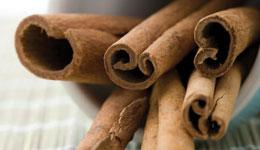Cinnamon

Sweet holiday spice may be cancer's bitter enemy
Cinnamon is one of the most ancient spices in human history, and if it’s not the most popular, it soon may be. Researchers have found that the aromatic spice appears to have unique cancer-stunting properties.
Cinnamon comes from the bark of a small evergreen tree. Reporting in the journal Carcinogenesis, scientists in City of Hope’s Department of Cancer Biology and Molecular Medicine showed that extracts of the spice may be able to block the growth of blood vessels in tumors.
Tumors need a constant supply of new blood vessels to bring them nourishment to keep growing. So, they continually promote new blood vessel growth, a process called angiogenesis.
Knowing this, researchers are constantly searching for compounds that can block angiogenesis. Every now and then, the hard work pays off.
“We found that a water-based extract from cinnamon was a potent angiogenesis inhibitor,” said Wei Wen, Ph.D., assistant professor of molecular medicine and senior author on the study.
The cinnamon extract works by interfering with VEGF, short for vascular endothelial growth factor. VEGF is a protein that promotes angiogenesis. It can be highly active in tumors.
VEGF works by connecting to one or both of its protein receptors, called VEGFR1 and VEGFR2. These receptors stick out from the surface of cells. When VEGF binds to them, they activate a cascade of biochemical reactions that lead to blood vessel growth.
In lab experiments, Wen and her team found that the extract of cinnamon blocked VEGFR2, preventing VEGF from binding to the receptor. That, in turn, stopped angiogenesis, and that’s bad news for tumors.
The study was part of the group’s ongoing search for natural compounds that can prevent VEGF from binding to its receptors. Researchers are interested in finding drugs that target VEGF to choke the flow of blood to tumors, explained Wen. But side effects from these drugs can be difficult on patients, which limits their long-term use.
Wen believes finding naturally occurring VEGF inhibitors is a promising alternative approach.
“Plus, since these substances are from our normal diet, we already know they are safe,” she added.
Wen’s search for natural VEGF inhibitors previously resulted in her discovery of VEGF-blocking ability in grape seed extract, a popular nutritional supplement. Wen hopes to study the cinnamon extract in mice with tumors to determine if it can block angiogenesis and slow or stop tumor grow.
Cinnamon comes from the bark of a small evergreen tree. Reporting in the journal Carcinogenesis, scientists in City of Hope’s Department of Cancer Biology and Molecular Medicine showed that extracts of the spice may be able to block the growth of blood vessels in tumors.
Tumors need a constant supply of new blood vessels to bring them nourishment to keep growing. So, they continually promote new blood vessel growth, a process called angiogenesis.
Knowing this, researchers are constantly searching for compounds that can block angiogenesis. Every now and then, the hard work pays off.
“We found that a water-based extract from cinnamon was a potent angiogenesis inhibitor,” said Wei Wen, Ph.D., assistant professor of molecular medicine and senior author on the study.
The cinnamon extract works by interfering with VEGF, short for vascular endothelial growth factor. VEGF is a protein that promotes angiogenesis. It can be highly active in tumors.
VEGF works by connecting to one or both of its protein receptors, called VEGFR1 and VEGFR2. These receptors stick out from the surface of cells. When VEGF binds to them, they activate a cascade of biochemical reactions that lead to blood vessel growth.
In lab experiments, Wen and her team found that the extract of cinnamon blocked VEGFR2, preventing VEGF from binding to the receptor. That, in turn, stopped angiogenesis, and that’s bad news for tumors.
The study was part of the group’s ongoing search for natural compounds that can prevent VEGF from binding to its receptors. Researchers are interested in finding drugs that target VEGF to choke the flow of blood to tumors, explained Wen. But side effects from these drugs can be difficult on patients, which limits their long-term use.
Wen believes finding naturally occurring VEGF inhibitors is a promising alternative approach.
“Plus, since these substances are from our normal diet, we already know they are safe,” she added.
Wen’s search for natural VEGF inhibitors previously resulted in her discovery of VEGF-blocking ability in grape seed extract, a popular nutritional supplement. Wen hopes to study the cinnamon extract in mice with tumors to determine if it can block angiogenesis and slow or stop tumor grow.